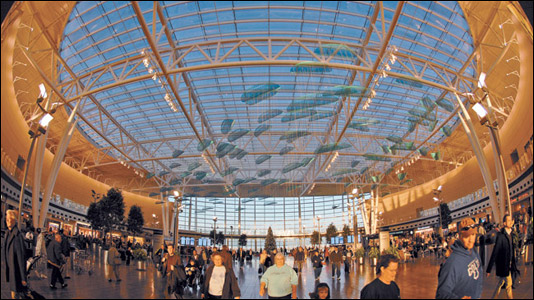Subscriber Benefit
As a subscriber you can listen to articles at work, in the car, or while you work out. Subscribe NowIt’s beginning to look a lot like a hectic holiday travel season, but it might go relatively smoothly if the weather cooperates.
Travel over Christmas and New Year’s tends to spread out over many days, so the peaks in the U.S. are likely to be lower than they were during the Thanksgiving holiday. That is making airlines and federal officials optimistic.
But the debacle at Southwest Airlines over Christmas last year should guard against overconfidence. Just this week, the Transportation Department announced a settlement in which Southwest will pay $140 million for that meltdown, which stranded more than 2 million travelers.
So far this year, airlines have canceled 1.2% of U.S. flights, down nearly half from 2.1% over the same period last year. Cancellations were well below 1% during Thanksgiving, according to FlightAware.
“I don’t want to jinx us, but so far 2023 has seen the lowest cancellation rate in the last five years,” Transportation Secretary Pete Buttigieg said Tuesday. He added, however, that winter weather “will certainly be a challenge in the next few weeks.”
Canceled flights surged last year, as airlines were caught short-staffed when travel rebounded from the pandemic more quickly than expected. Since then, U.S. airlines have hired thousands of pilots, flight attendants and other workers, and the cancellation rate has come down.
After struggling with cancellations and other disruptions last year, European travel has also been smoother this year and more people are expected travel over Christmas and New Year’s, said Mike Arnot, spokesman for Cirium, an aviation analytics company. Still, about 3% of flights within Europe have been canceled in so far in December, and nearly 30% have been delayed, according to Cirium.
Cirium projected that the number of seats flown within Europe will rise 10% between Dec. 22 and Jan. 2 compared to the similar period in 2023.
High winds from a storm named Pia disrupted travel Thursday in the Netherlands, Denmark and northern areas of the U.K.
More than a quarter of flights arriving and departing Amsterdam Airport Schiphol were canceled Thursday, and hundreds of flights were delayed, according to Flightaware. Copenhagen Airport in Denmark warned that weather conditions posed a “risk of delays and cancellations,” especially on Thursday night.
In the U.K., train service was suspended or slowed, and ferries stopped running to islands off Scotland’s west coast. British Airways grounded two dozen flights, British broadcaster Sky News reported. A spokesperson for the airline did not provide further details but apologized to customers for having to “make some adjustments” to its schedule.
Globally, air travel has still not fully recovered from the COVID-19 pandemic.
About 8.6 billion people are projected to travel through the world’s airports in 2023, according to Airports Council International, a Montreal-based trade group for airports. That’s about 94% of the passenger volume in 2019, before the pandemic hit.
The U.S. Federal Aviation Administration says it is creating more air-traffic routes, especially along the East Coast, to help keep planes moving over the holidays.
Over the past year, airlines have blamed many of their delays on a shortage of FAA air traffic controllers that slows down traffic. The agency, which pressured airlines to reduce flights in the New York City area this summer and fall because of FAA understaffing, says it has been hiring and now has 10,700 certified controllers.
“There are different views on what the number should be, but it needs to be a lot higher,” new FAA Administrator Mike Whitaker said Tuesday.
AAA is forecasting that 115 million people will go 50 miles or more from home between Saturday and New Year’s Day. That is a 2% increase over the auto club’s forecast last year, although it would fall short of the record set in 2019.
Most of those people will drive, and they will save a bit on gasoline, compared with last Christmas. The nationwide average Wednesday was $3.08 a gallon, down 23 cents from a month ago and 6 cents from this time last year, according to AAA.
The busiest days on the road will be Saturday and next Thursday, Dec. 28, according to transportation data provider INRIX.
The Transportation Security Administration expects that the busiest days for air travel will be Thursday, Friday and New Year’s Day. TSA expects to screen more than 2.5 million travelers each of those days — that’s still far short of the record 2.9 million that agents screened on the Sunday after Thanksgiving.
Flying in the U.S. is already surpassing pre-pandemic levels. The TSA has screened 12.3% more travelers than it had by this time last year and 1.4% more than in 2019. December is running about 6% above the same month last year.
The low rate of cancellations over Thanksgiving is leading to hope that flying over Christmas and New Year’s will be tolerable.
But even if cancellations remain low, flights will be packed, testing the patience of travelers and creating competition for space in overhead bins to store carry-on bags.
“Airline gate agents are getting demerits when planes are late, so they are gate-checking far more bags to keep flights on time,” said Pauline Frommer co-president of Frommers Travel Guides.
Frommer advises putting a smart tag in any bag that gets checked so you’ll know where it is, even if the airline doesn’t.
Whether flying or driving, travelers should be keeping an eye on the weather forecast.
AccuWeather forecasters say rain storms could hit California, the Pacific Northwest and the southern Plains states including Texas later this week, but things look brighter for population centers — and key airports — in the Northeast.
“Last year was a really rough travel holiday,” said AccuWeather’s Paul Pastelok. “This year it looks like milder conditions. There isn’t much snow and ice on the horizon yet.”
Please enable JavaScript to view this content.

